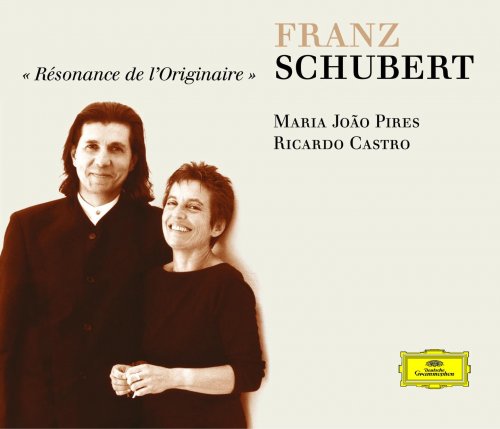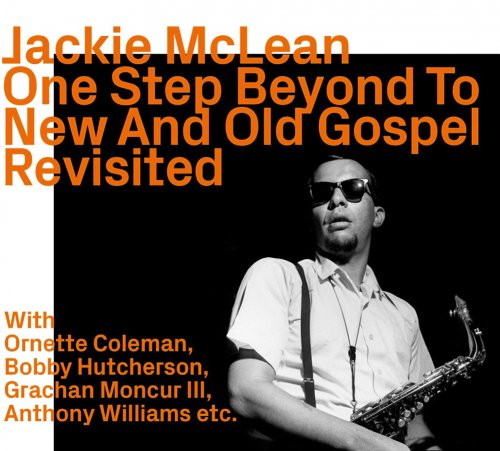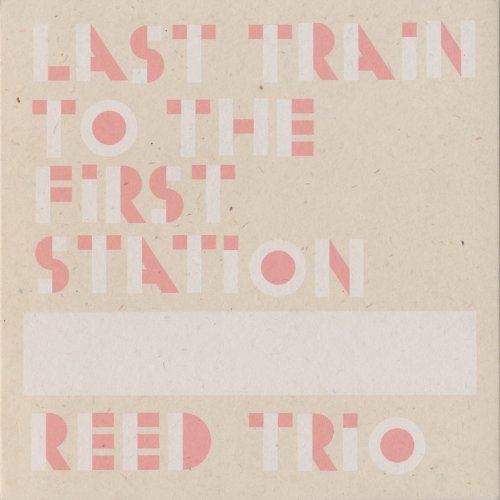Maria João Pires, Ricardo Castro - Schubert: Works for Piano Duet and Piano Solo (2004)

Artist: Maria João Pires, Ricardo Castro
Title: Schubert: Works for Piano Duet and Piano Solo
Year Of Release: 2004
Label: Deutsche Grammophon
Genre: Classical
Quality: FLAC (tracks)
Total Time: 01:32:36
Total Size: 258 Mb
WebSite: Album Preview
Tracklist: Title: Schubert: Works for Piano Duet and Piano Solo
Year Of Release: 2004
Label: Deutsche Grammophon
Genre: Classical
Quality: FLAC (tracks)
Total Time: 01:32:36
Total Size: 258 Mb
WebSite: Album Preview
CD 1
Fantasy in F minor, D. 940 (Op.103) for piano duet (Franz Schubert)
1. Schubert: Fantasy in F Minor, D. 940 (Op. 103) For Piano Duet 18:39
Grand Rondeau in A major, D 951 (Franz Schubert)
2. Schubert: Grand Rondeau in A Major, D. 951 09:31
Piano Sonata No. 13 in A Major, D. 664 (Franz Schubert)
3. I. Allegro moderato 10:41
4. II. Andante 05:17
5. III. Allegro 07:29
CD 2
Piano Sonata No. 14 in A Minor, D. 784 (Franz Schubert)
1. I. Allegro giusto 13:43
2. II. Andante 04:05
3. III. Allegro vivace 05:24
Allegro in A minor, D 947 'Lebensstürme' (Franz Schubert)
4. Schubert: Allegro in A Minor, D 947 "Lebensstürme" 17:42
Performers:
Maria João Pires, piano
Ricardo Castro, piano
The nice thing about concept albums such as those that DG graciously--in this day when artistry must bow to cost accounting--allows Maria Joao Pires to put together is that even if you have some of the music in other incarnations, the interpretations are usually so freshly thought out that you don't mind duplicating. I have most of this music on other discs, as most Schubertians will, and in fact have Pires' earlier recording, with Huseyin Sermet, of the Fantasie in F minor on the Erato label. The earlier interpretation is a fine one, though there is a greater poignancy in the DG performance; the deep sadness inherent in this music is almost heartbreakingly conveyed. This is a special performance indeed.
Both discs also contain interpretations of the Rondo in A major, and it's interesting to note that Pires/Castro shave almost half a minute off the time of Pires/Sermet. This is, of course, comparatively sunny and untroubled music, but I think the slower tempo lets the piece smile a little more. So I favor Pires/Sermet in this music. But at least Pires is not tied slavishly to a single conception of the work.
As to the Sonata D. 664, Pires turns in a gentle, delicately shaded performance that I find does full justice to the work. The same can be said for Ricardo Castro's performance of the less characteristic A minor sonata. Here, the long, ruminative first movement is pure Schubert, but the second movement is, for Schubert, almost aphoristic, and the last movement is an equally atypical toccata-like affair though with a tender second melody that, again, could only be the work of the Austrian master. Castro's sure finger work and ringing tone are just as welcome here as is his fine hushed playing in the slow movement.
I was not familiar with the "Lebenssturme" (Storms of Life), but hearing it, I understand why nineteenth-century composers after Schubert's death thought that the four-hand piano music contained disguised symphonies and symphonic movements. This allegro is an example of the "heavenly length" that Schumann praised and seems almost too generously endowed for the intimate nature of the piano duet experience. Like Schubert's late symphonic works, "Lebenssturme" suggests the composer's Beethovenian interest in structures based on brief musical motives, and in fact the piece is so intent on a single four-note motive that it could almost be called monothematic. The gorgeous, long-breathed second melody and stormy first melody are both built up from this figure.
Pires and Castro luxuriate in Schubert's passionate and beautiful drama. At almost eighteen minutes, their performance may dawdle a bit, and I'd appreciate just a tad more storminess at critical junctures, but I can't imagine a performance more sensitive to the beauty of hope and striving that Schubert found amid the storms of his own brief, sad life. Overall, this is a lovely, loving, and tender performance.
I wish I could have learned a bit more about the music, but the notes to the recording, written by a psychoanalyst, are pure bombast that has nothing to do either with the music or with Schubert's psyche. DG always offers this sort of palaver along with their concept albums, whether by Pires or Grimaud. They could save the paper as far as I'm concerned; I only came for the music anyway. DG does also offer a full, rich recording made in Portugal, though.
Recommended for Pires fans and Schubert fanciers alike.
Both discs also contain interpretations of the Rondo in A major, and it's interesting to note that Pires/Castro shave almost half a minute off the time of Pires/Sermet. This is, of course, comparatively sunny and untroubled music, but I think the slower tempo lets the piece smile a little more. So I favor Pires/Sermet in this music. But at least Pires is not tied slavishly to a single conception of the work.
As to the Sonata D. 664, Pires turns in a gentle, delicately shaded performance that I find does full justice to the work. The same can be said for Ricardo Castro's performance of the less characteristic A minor sonata. Here, the long, ruminative first movement is pure Schubert, but the second movement is, for Schubert, almost aphoristic, and the last movement is an equally atypical toccata-like affair though with a tender second melody that, again, could only be the work of the Austrian master. Castro's sure finger work and ringing tone are just as welcome here as is his fine hushed playing in the slow movement.
I was not familiar with the "Lebenssturme" (Storms of Life), but hearing it, I understand why nineteenth-century composers after Schubert's death thought that the four-hand piano music contained disguised symphonies and symphonic movements. This allegro is an example of the "heavenly length" that Schumann praised and seems almost too generously endowed for the intimate nature of the piano duet experience. Like Schubert's late symphonic works, "Lebenssturme" suggests the composer's Beethovenian interest in structures based on brief musical motives, and in fact the piece is so intent on a single four-note motive that it could almost be called monothematic. The gorgeous, long-breathed second melody and stormy first melody are both built up from this figure.
Pires and Castro luxuriate in Schubert's passionate and beautiful drama. At almost eighteen minutes, their performance may dawdle a bit, and I'd appreciate just a tad more storminess at critical junctures, but I can't imagine a performance more sensitive to the beauty of hope and striving that Schubert found amid the storms of his own brief, sad life. Overall, this is a lovely, loving, and tender performance.
I wish I could have learned a bit more about the music, but the notes to the recording, written by a psychoanalyst, are pure bombast that has nothing to do either with the music or with Schubert's psyche. DG always offers this sort of palaver along with their concept albums, whether by Pires or Grimaud. They could save the paper as far as I'm concerned; I only came for the music anyway. DG does also offer a full, rich recording made in Portugal, though.
Recommended for Pires fans and Schubert fanciers alike.
![Petros Klampanis - Minor Dispute (2025 Remaster) (2026) [Hi-Res] Petros Klampanis - Minor Dispute (2025 Remaster) (2026) [Hi-Res]](https://www.dibpic.com/uploads/posts/2026-01/1768403356_jyohrjvwmk7at_600.jpg)


![Enrico Pieranunzi, Orchestra i Pomeriggi Musicali & Michele Corcella - Improclassica (2026) [Hi-Res] Enrico Pieranunzi, Orchestra i Pomeriggi Musicali & Michele Corcella - Improclassica (2026) [Hi-Res]](https://www.dibpic.com/uploads/posts/2026-01/1768381306_glelgvcvvilia_600.jpg)




